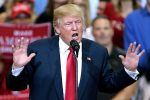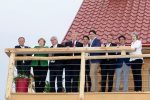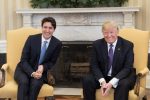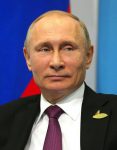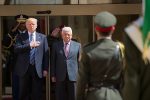עכשיו זה כבר ברור לרבים: נשיא ארה”ב, דונלד טראמפ, גורם נזק ממשי לכלכלת העולם. טראמפ שמתהלך ומתנהג כבריון שכונתי מאיים על כולם, מביא לפרוד רציני בין ארה”ב לאירופה וקנדה ושאר הידידות המסורתיות שלה, דבר שרק מעלה חיוכים אצל הרוסים והסינים. טראמפ שהוא בסך הכל סוחר ממולח וכוחני עד להחריד עם מונטין רע מאוד (כאשר מי שעשה עימו עסקים בעבר לא יעיז בכלל להתקרב אליו עוד), חושב שזו הדרך לנהל יחסים דיפלומטים עם המדינות החשובות בעולם. אך הוא לא מבין בתחום זה כמו בתחומים רבים אחרים (מלבד בלעשות כסף), הוא לא מכיר את ההיסטוריה ולא מכבד את מי שיש לו דעה אחרת, ובדרך כלל מדובר בליבראלים ובאנשים משכילים ממנו, שמחפשים לשתף פעולה אחד עם השני – בניגוד הגמור אליו.
בכל פעם שאחד ממנהיגי המדינות החשובות בעולם נאלץ להיפגש עם טראמפ, רואים בברור שהוא לא רווה נחת והיה מעדיף להיות רחוק מהנשיא האמריקני עד כמה שאפשר. בין היתר מדובר בראש ממשלת קנדה, ג’סטין טרודו, שהבין מהר מאוד שגם הוא לא חסין וטראמפ יתקיף גם אותו. לא נראה שטראמפ יודע לנהוג אחרת. עד עידן טראמפ ארה”ב וקנדה נחשבו לידידות קרובות ביותר ובעלות ברית בלתי ניתנת לערעור. השכנות ביניהן הפכה אותן לא פעם כמעט למדינה אחת. אך טראמפ הרס את הקשר המיוחד הזה של שתי המדינות, כמו שהוא הורס כל דבר אחר בו הוא נוגע.
לפי עיתון הפייננשל טיימס הבריטי מלחמת הסחר בה פתח טראמפ בתרחיש הגרוע שלה, יכולה להתנפח אף לטריליון דולר. היקף המכסים שארה”ב הטילה ובתגובה קנדה, מקסיקו, האיחוד האירופי וסין הטילו מכסים מצדן, יכול להשתוות בהיקף כולל לכרבע המסחר של ארה”ב עם העולם, או לחילופין ישתווה לשישה אחוזים מהיקף המסחר העולמי בסחורות (במונחים של אשתקד).
להלן שלוש הסיבות העיקריות לכך שמלחמת הסחר יכולה להגיע להיקף של כטריליון דולר:
1. ארה”ב הטילה מכסים על סחורות סיניות בהם דודי שמש ומחרטות לרובטים תעשייתים ורכבים חשמלים. בתגובה סין הטילה מכסים על סחורות אמריקניות בהם פולי סויה, מאכלי ים ונפט גולמי. טראמפ הרגזן הודיע כי יטיל מכסים על מוצרים סינים נוספים וסין מצידה איימה שוב בתגובה הולמת. לכן ניתן להעריך כי בתוך מספר חודשים רוב או כל הסחר בין ארה”ב לסין שמגיע לכ-640 מיליארד דולר – ימוסה. סין תגיב מצידה בצעדים לכיסוי הפער.
2. טראמפ מאיים בהטלת מכסים בגובה של כ-20 אחוז על כלי רכב וחלקים לכלי הרכב, בטענה המגוחחת שזה פוגע בביטחון הלאומי של ארה”ב. אשתקד ארה”ב ייבאה כלי רכב בשווי כ-192 מיליארד דולר וחלקים לכלי הרכב בשווי כ-143 מיליארד דולר. האיחוד האירופאי, יפאן וקנדה מאיימות בהטלת מיסים משלהן באותו היקף. כך שימוסו סחורות עולמיות בשווי כ-650 מיליארד דולר.
3. טראמפ ממשיך לאיים על שתי השכנות של ארה”ב קנדה מצפון ומקסיקו מדרום, כי יבטל את הסכם הסחר החופשי של צפון אמריקה נפט”א. דרישותיו בהן הסכם חדש כל חמש שנים נדחו על ידי קנדה ומקסיקו. ארה”ב הטילה בשלב זה מיסים על פלדה ואלומיניום מקנדה ומקסיקו, ועתה היא מאיימת במיסים על כלי הרכב וחלקים לכלי הרכב המיוצרים אצלן. אשתקד ארה”ב ייבאה כלי רכב וחלקים לכלי הרכב מקנדה ומקסיקו בשווי של כ-158 מיליארד דולר (במסגרת הסכם נפט”א).

